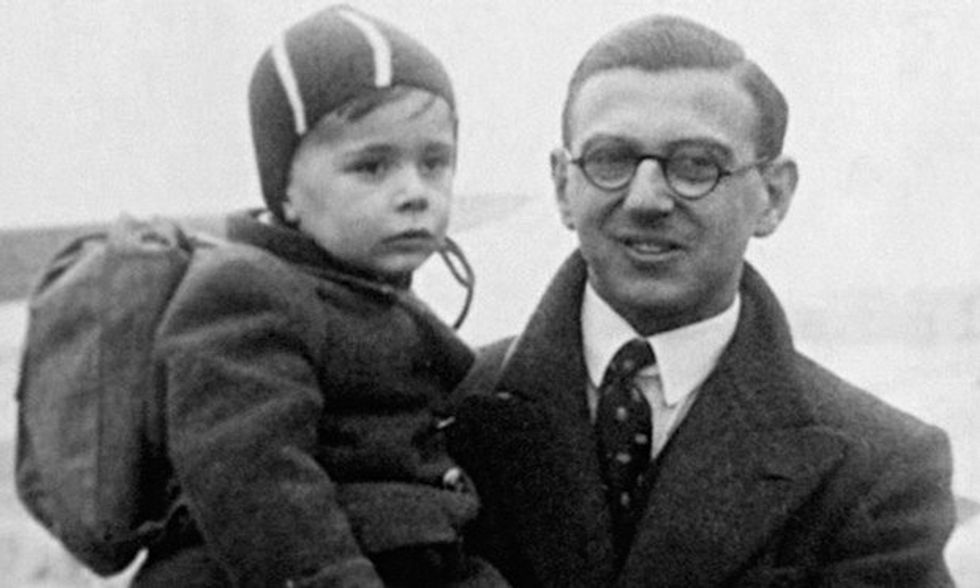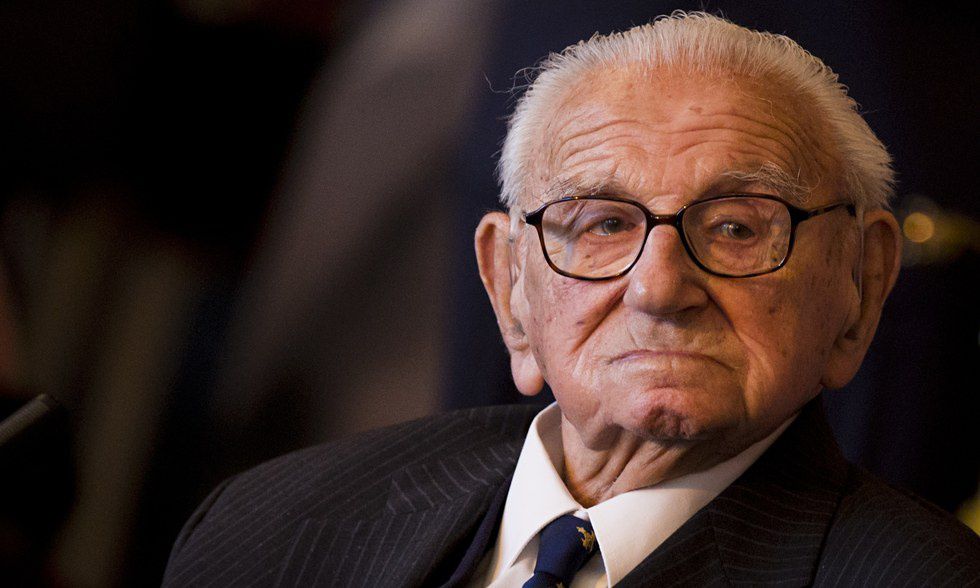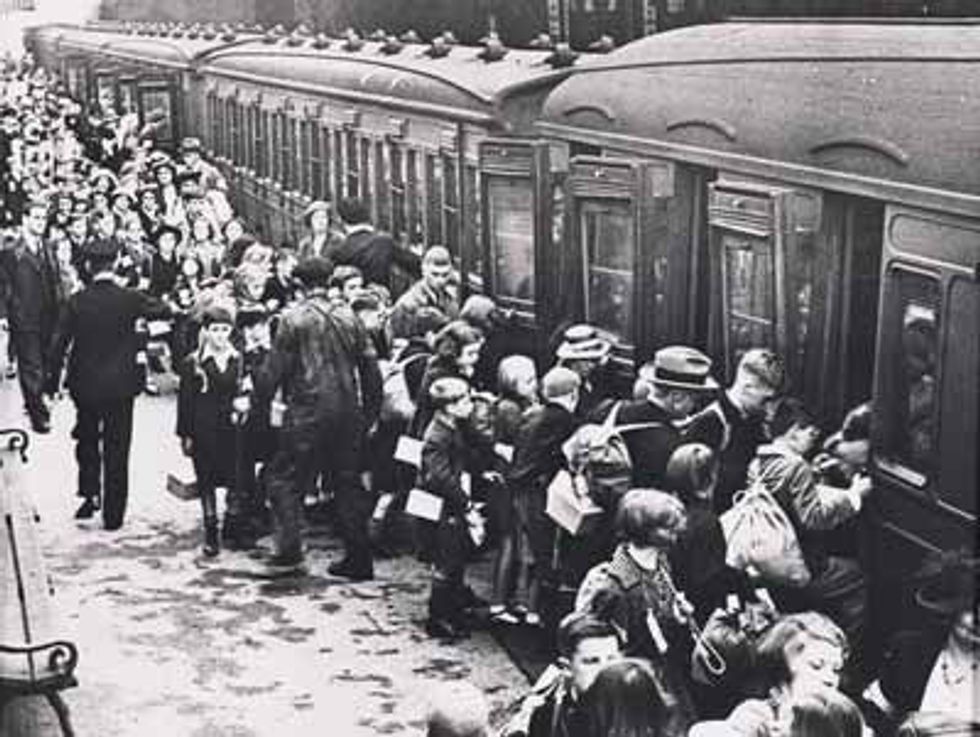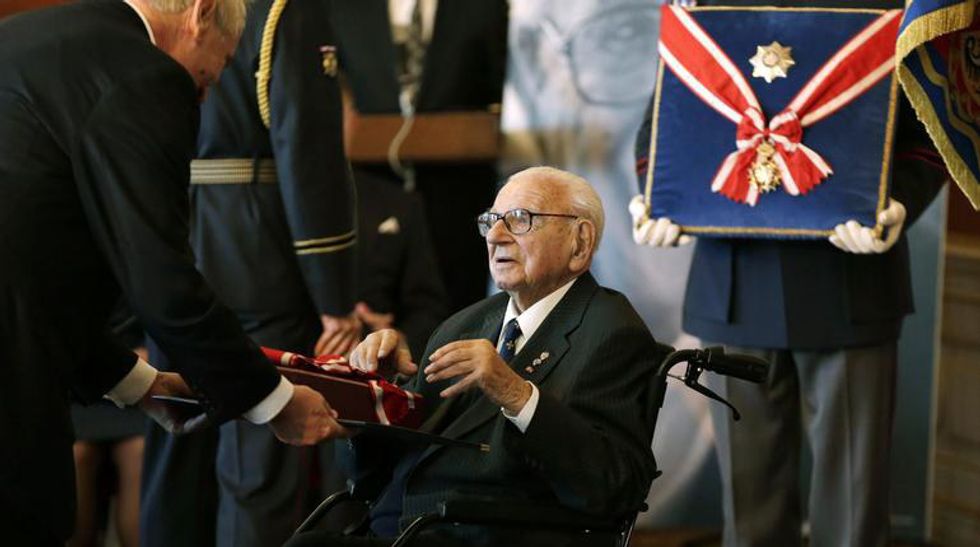This Wednesday, July 1, 2015, the world lost Sir Nicholas Winton, a great hero who led the rescue mission of nearly 700 children from Czechoslovakia during the Holocaust and never told a soul. No one knew about his humanitarian deeds until fifty years later when his wife Greta discovered an old scrapbook in the family's attic. He was called "The British Schindler" by many, including Rabbi Lord Jonathan Sacks who added, "he was...all the more impressive for thinking that there was nothing special about what he did, seeking neither honor nor recognition." Winton was born May 19, 1909 and died peacefully in his sleep on Wednesday in Maidenhead England at the age of 106. This is his story:
(photo via www.theguardian.com)
In December of 1938, the 29-year-old London stockbroker received a phone call from his friend, Martine Blake, requesting his help in Prague. Winton arrived in Prague and began helping out a British team in refugee camps. While Britain had the "Kindertransport" program in place, which aided unaccompanied Jewish children under the age of 17 across Europe, no efforts were being made in Czechoslovakia – until Winton. Throughout his work in the refugee camps, he noticed "the commission was dealing with the elderly and vulnerable and people in the camps kept telling me that nobody was doing anything for the children,” and knew he had to do something. For the next months, Winton arranged for almost one thousand children to be adopted by mainly British families, receiving some money from donors and covering the rest of the immense expenses himself. Beyond money, the operation involved serious risks and dangers as well as bribery, forgery, and piles of paperwork.
The first of eight London-bound trains was sent off on March 14, 1939 and in the following weeks, all 669 children arrived in Liverpool with suitcases and name tags to meet their new families. However, the last train, which carried the largest group, 250 children, disappeared on September 3, 1939, hours after the announcement of German invasion in Poland and the shutdown of all borders. Winton, always wishing he could save more, carried the grief of the lost train with him throughout the rest of his life and commented, "None of the 250 children on board was seen again. We had 250 families waiting at Liverpool Street that day in vain. If the train had been a day earlier, it would have come through. Not a single one of those children was heard of again, which is an awful feeling." Nearly all of the biological parents of the 669 children were killed in concentration camps – a doomed fate that they saved their children from with Winton's help.
Fifty years later, in 1988, Winton's wife Greta discovered the scrapbook with the names and information of all the children. When asked about it, Winton told his wife she could throw it away and later stated, "I did not think for one moment that they would be of interest to anyone so long after it happened." Against his wishes, Greta presented the scrapbook to a Holocaust historian, which turned it into a BBC documentary, launching Winton's recognition with countless awards, the building of memorials in his honor, and the his knighting in 2003 by Queen Elizabeth II. In a 2001 New York Times interview, Winton shared his humble reasoning with, "One saw the problem there, that a lot of these children were in danger, and you had to get them to what was called a safe haven, and there was no organization to do that. Why did I do it? Why do people do different things? Some people revel in taking risks, and some go through life taking no risks at all." He simply added "I just saw what was going on and did what I could to help."
Ms. Gissing, author of Nicholas Winton and the Rescued Generation: Save One Life, Save the World points out that “Winton still shakes his head in bewilderment and disbelief when compared with Oskar Shindler and Raoul Wallenberg," a level of praise he is nonetheless truly deserving of. To honor Winton, a train of some of the original 'Winton children,' as they still call themselves, met him, together with many of their now 6,000 descendants, at the Liverpool Street Station on September 1, 2009.
Sir Nicholas Winton was a reluctant hero, seeking neither recognition nor fame. His contributions to the human race should serve as inspiration to all, and as a reminder that one person really can make a difference.
























